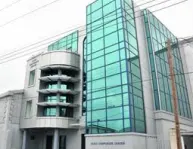
Chief executive, Caribbean Banking at RBC, Suresh Sookoo in an interview on the sixth floor of his St Clair, Port of Spain office last week. —Photo: Mark Bassant
The media across the Caribbean has been highlighting the matter of whether Royal Bank/RBTT employees are being marginalized. According to our source employees are disappointed about the deafening silence of the local media – see Trinidad Express article. Our source opines that in local banking circles RBC has become a laughing stock, the merger has done nothing except hurled the bank to the doldrums.
BU is being told personal lending has all but dried as a result of increasing delinquency. It is alleged the lenders at the bank are being told to move away from the mass market and to concentrate on the professionals groups like doctors, lawyers for example.
Workers continue to await the outcome of union and management of the bank but it appears to be a ‘Mexican Standoff’. During the stalled talks employees are being severed, ‘final warning’ letters are given to those especially in lending who have gotten a ‘low performance’ appraisal for the last two years, with the ultimate action being termination if improvement is not shown.



























You must be logged in to post a comment.